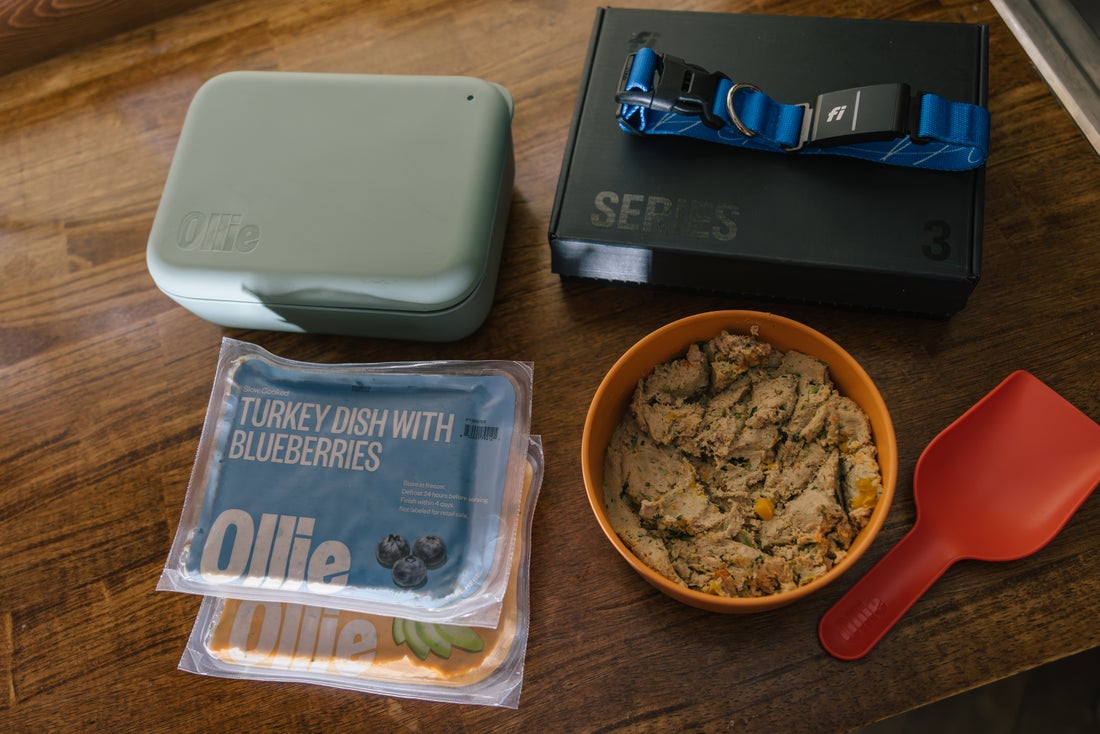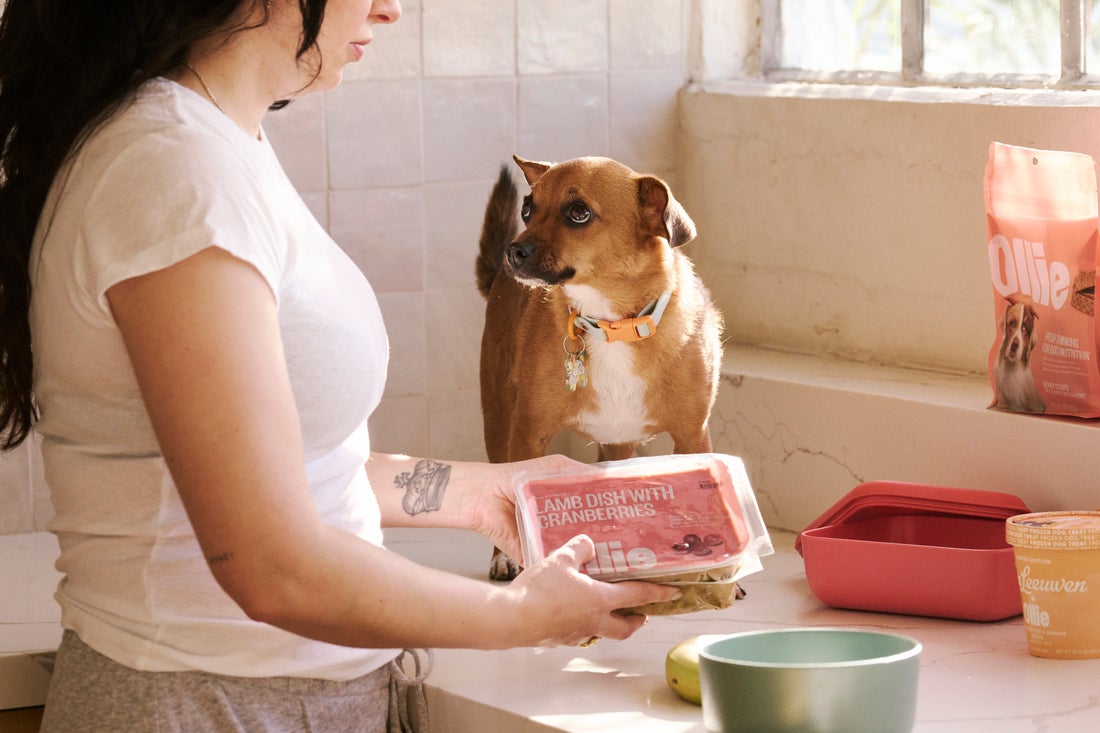Hey Ollie blog readers! We’re offering you an exclusive 60% OFF your starter box! Try now!
Routine veterinary care is key to your dog’s health, happiness, and longevity—but how often should you take your dog to the vet? In addition to regular exams, vaccines, and preventive care, how can you tell if your pup needs unexpected care? We answer these questions and reveal how Ollie’s on-demand, personalized Health Screening can help you fetch the expert guidance and advice you need to support your dog’s health.
Recommended Veterinary Care By Your Dog’s Age
Your dog’s health requirements will vary throughout their life, making it important to heed any changes in your veterinarian’s care recommendations. Further, if your pup has a chronic condition they may require more frequent visits throughout their lifetime to ensure they feel their best. General age-based guidelines for healthy dogs are outlined below.
Puppies
Puppies undergo rapid physical and mental development during the first year of life. During this time, their immune system is also developing—leaving them vulnerable to many harmful parasites and potentially fatal viruses. Frequent veterinary exams are essential for ensuring a healthy headstart, tracking your puppy’s growth, identifying congenital conditions, receiving valuable training advice, and administering preventive care such as vaccines and deworming. Regular vaccinations ensure your puppy receives adequate immune protection against diseases such as parvo and distemper.
Adult Dogs
After your puppy’s busy first year, veterinary visits will be less frequent but are still critical for maintaining their health and wellness. During these middle-life years, most of your dog’s care will still focus on preventing illness, injury, and disease through routine exams, health screenings, nutrition, behavior advice, and vaccination. Annual or twice-annual exams and health screening tests ensure your veterinarian can detect subtle health changes before they become serious problems.
If your dog is pregnant, expect visits to increase in frequency to ensure mother and puppies receive appropriate support.
Senior Dogs
As dogs age, they generally require increased care and support—including more frequent veterinary visits. Most veterinarians recommend scheduling an exam and more in-depth screening tests such as blood work or imaging every six months. This extra effort is well worth the investment, as the focus of your dog’s visits shifts from preventing problems to identifying and addressing age-related decline. But don’t worry, there are still a variety of ways to support your senior companion and help them feel like a pup again!
Common Symptoms To Watch For In Dogs
While routine veterinary care is an effective way to enhance and support your dog’s lifelong health, your four-legged friend’s wellness doesn’t stick to a set schedule. Unexpected injuries, illnesses, and conditions can interrupt your pup’s happiness and health, necessitating additional trips to the veterinarian. For these occasions, early attention can ensure a faster diagnosis and better recovery. Schedule a veterinary exam if your dog experiences changes in their physical or emotional health, including those outlined below.
Digestive Issues
Digestive disruptions, such as vomiting, appetite loss, abnormal or loose poop, diarrhea, constipation, and gas, signal a disturbance in your pup’s upper or lower gastrointestinal tract. Left untreated, these problems can lead to additional complications including dehydration and decreased nutrient absorption. Depending on the underlying cause, treatment for digestive issues can range from medication and fluids to emergency surgery—so don’t wait to seek veterinary care when digestive problems arise.
Dental Issues
Many owners overlook their pup’s dental health, but your dog’s oral hygiene has a significant impact on their well-being. Bacteria from unchecked dental disease can spread to other parts of the body via the bloodstream and cause widespread damage. Regular dental care—including professional dental cleanings and X-rays at your veterinarian’s office—can help prevent or minimize dental disease. Early warning signs include bad breath, visible tartar, red or irritated gums, and visibly broken or discolored teeth.
Submit a dental health screening for help from the Ollie Health Team!
Weight Changes
Your dog’s weight is influenced by a variety of health factors including diet, exercise, metabolism, certain health conditions, and whether they are spayed or neutered. Sudden or steady weight gain or loss—aside from those due to planned weight loss or pregnancy—can signal an underlying problem and should be investigated by your veterinarian. Although you may be tempted to adjust your pet’s portions before seeking professional care, this can complicate the problem and cause a potentially harmful delay in your dog’s treatment.
Behavior Changes
Your dog’s behavior is more than a matter of obedience. Uncharacteristic changes in your pup’s personality or mood can be motivated by pain, illness, or stress and should first be examined in a veterinary setting before pursuing corrective training. Common examples include unexplained irritability, aggression, excessive fear, isolation, house soiling, destructive behavior (e.g., chewing, digging), avoiding previously enjoyable activities (e.g., playing with toys, taking walks) or actions (e.g., climbing stairs, jumping in the car), and eating non-food items.
Help Is Here: Get in Touch with a Certified Vet Technician Through the Ollie App
While it’s easy to know when to book your pup’s annual or bi-annual appointment, knowing how to correctly support their health in the in-between times can feel less clear. Ollie’s Health Screenings allow you to track your pup’s health from the comfort of your home and receive tailored, knowledgeable advice and recommendations—including when to see the vet for a more detailed exam. This member-exclusive perk helps you understand and support your pet’s dental, digestive, and behavioral health and assess their weight, allowing you to feel good about your current care routine, anticipate future problems, and take positive steps to support their lifelong health.
The Ollie blog is devoted to helping pet parents lead healthier lives with their pups. If you want to learn more about our fresh, human-grade food, check out MyOllie.com.
Tagged As:

The nutrition your dog needs,
the food they want.

Enjoying our articles? Subscribe our Newsletters and get new articles directly to your inbox
You might also like
18 September 2025
5 MINS READ
Can I Rotate Fresh Dog Food Flavors?
Yes, it’s safe to rotate fresh dog food flavors, and many dogs actually benefit from the variety. At Ollie, we offer multiple fresh recipes, like Beef, Chicken, Turkey, Lamb, and Pork so you can…
by Ollie Pets
18 September 2025
5 MINS READ
Is Fresh Dog Food Safe During Power Outages?
Fresh dog food is only safe during a power outage if it has stayed cold, specifically, below 40°F. Once the temperature rises above that point, bacteria can start to grow, and the food may no lon…
by Ollie Pets
18 September 2025
5 MINS READ
How Do I Store Fresh Dog Food While Traveling?
If you’re bringing fresh dog food on the road, keeping it cold is key. The best way to store it is in a cooler with ice packs or a travel freezer. At Ollie, our vacuum-sealed fresh food stays good…
by Ollie Pets







